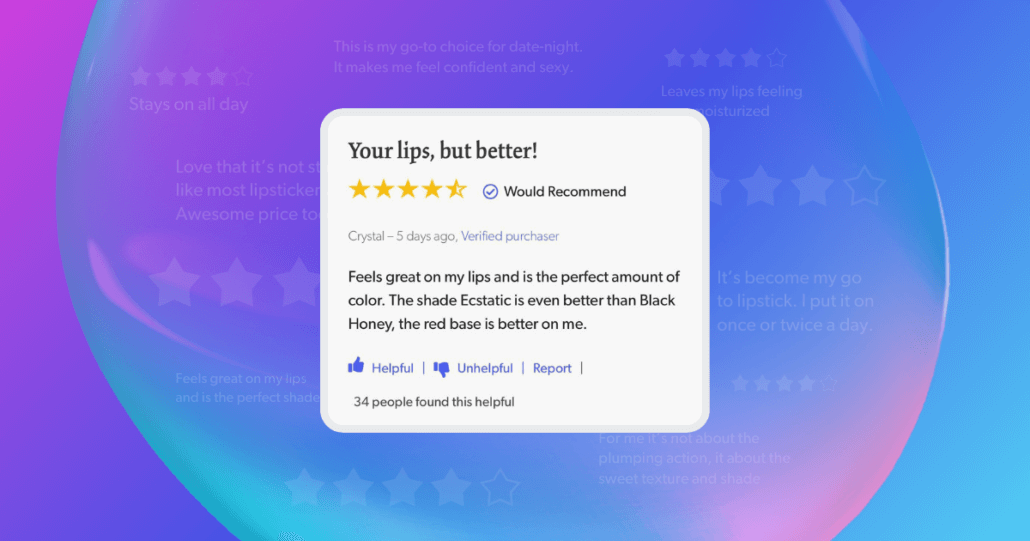July 11, 2024
Shoppers may be finalizing details for family vacations and barbecues, but a quarter of consumers worldwide will finalize Christmas lists and purchasing gifts by August. Data-driven decisions can give your firm a competitive edge, allowing you to perfect PDPs, capture the attention of social media shoppers, and optimize the overall holiday shopping experience.
The key to sharpening your holiday season tactics lies in understanding consumer trends and preferences. You may assume certain behaviors about a target demographic, but you could be surprised to learn that, for example, Gen Z is still the most likely demographic to begin holiday shopping at the mall. Awareness of such details can elevate your holiday strategy to the next level.
Bazaarvoice gathered data from thousands of shoppers worldwide to provide early insights into consumer trends for the 2024 holiday shopping season. With 8,230 respondents spanning 6 countries, we unwrapped festive purchasing habits from Gen Z to Boomers.
Check out the Sleigh the holiday season series here for an in-depth look at shopping behaviors from Gen Z to Boomers. For now, these are the top ten general insights from our research on 2024 consumer trends:
Decking the halls: How early is too early?
Depending on the shopper, bringing out the garlands and mistletoe before Halloween can be met with a sigh. Many respondents (62%) believe October or earlier is too early for stores to showcase holiday items and sales.

However, more than half of people will begin holiday shopping in October or earlier (55%), more than a third will start in September or earlier (37%), and almost a quarter will start in August or earlier (23%). And for a quarter of shoppers (26%), it’s never too early to feel the holiday moods.
Jolly for discounts
Sometimes, there’s nothing more satisfying than applying a discount code to your shopping cart.
More than half of respondents (52%) say they are more likely to purchase a holiday product online when the website provides a discount code. Gen Z (67%) and respondents from the UK (57%) are the most likely to agree with this.
A third of participants (34%) say it depends on the product and its original price. Boomers (44%) and respondents from Germany (38%) are the most likely groups to agree with this.
Silent night: Not many review gifts they buy, but depend on reviews to buy them
Have you ever left a review for a product you purchased for someone else? Most people don’t. More than half of respondents (56%) don’t write reviews for holiday gifts they purchase for others.
However, 26% of respondents said they “sometimes” will leave a review, and 19% say they do.
There’s a good chance a gift review has been written by a Millennial. They are the most likely group to write a review for a holiday gift they buy for others (30%). Geographically, the US and France are the most likely to leave reviews (21% for both). Boomers (69%) and respondents from Australia (63%) are most likely to say no.
If a reviewer received a product in exchange for a review, would it affect your purchasing decision? Shoppers are pretty split on this. If they notice a product has incentivized reviews, 38% say it does not affect their purchasing decision. 22% say they’re more likely to buy the product. 21% say it makes them less likely.
Lastly, many shoppers are vetting reviews during holiday shopping. 40% say they will check to make sure there are positive and negative reviews. 29% will examine reviews closely to ensure they are written by humans. 18% are looking for a third-party symbol of authentication, such as a Trustmark.
Bazaarvoice 2024 Shopper Preference Report

The magic of dynamic pricing
Days like Black Friday and Cyber Monday can cause a wild frenzy during holiday shopping.
When it comes to shopping on social media, 68% of people think dynamic pricing, such as limited-time offers and flash sales, is “at least somewhat” influential in the holiday shopping experience.

Where should holiday content come from?
Scrolling on social media can be a great way to find the perfect gift. Whether it’s a beautiful still photo of a new product from a great brand, a random unboxing video from someone on your FYP, or a story about a hot item from your favorite influencer, the content we prefer can look different for everyone.
Bazaarvoice asked respondents what content they prefer to see on social media during the holiday season. Shoppers are pretty split on this.
46% of consumers prefer brand-created content. 44% prefer user-generated content.
Gen Z is most likely to seek out creator content on social media during the holidays than any other generation. They are the least likely of any group to seek out brand content (42%) and user-generated content (41%) content, but most likely want to see influencer-created content (17%).
Tech the halls: Shoppers are split on AI
AI has been a hot topic lately. Chances are, in casual conversations with family and friends, most people aren’t sure how to feel about it.
Can artificial intelligence authentically capture the holiday spirit? 39% of people think AI-generated social media content at least somewhat lacks a genuine touch. 37% of people are neutral about it. 24% believe AI can at least somewhat authentically capture the holiday spirit.
We asked shoppers if they’d care if a brand posted something completely AI-generated during the holiday season. Responses are almost completely split: 37% don’t care, 31% do care, 37% say it would depend on the post.
Would it actually have an impact on their purchasing decision, though? Almost half of respondents (46%) say the knowledge that a brand’s social media post is completely AI-generated would have no impact on their decision to make a purchase from that brand. 33% say it would at least have somewhat of a negative impact. 22% say it would at least have somewhat of a positive impact.
Whether or not a shopper can actually identify AI-generated content is another story. 41% of shoppers are not sure if they’ve seen AI-generated content on social media in the last year, but the same amount think they’ve seen it at least once. Boomers are the most likely to say they are not sure (57% of Boomer shoppers), and Gen Z is the most likely to say they have (67% of Gen Z respondents).
18% of shoppers think they’ve never seen AI-generated content on social media. Boomers are the most likely group to say they never have (18% of Boomer shoppers).
Video format shines brightest
When looking for holiday gifts, shoppers say video is the format on social media that will capture their attention the most effectively (37%). Most shoppers prefer to watch videos 1-5 minutes long (29%), followed by those who prefer to watch videos that are a minute or less (28%).
For those who are not interested in watching video content, 24% of shoppers prefer single photos, 13% prefer stories, 9% prefer photo carousels, and 9% prefer text-based posts. Boomers (12% of them) are the most likely group to prefer text-based posts.
Shoppers are split on whether or not content should be personalized. We asked if they find personalized content more engaging during the holiday season—33% said yes, 32% said no, and 35% said it depends on the content.
Tinseled trends: themes that reign supreme
When it comes to the media we consume each holiday season, many of us binge-watch our favorite Hollywood classics on repeat. Perhaps festive trends and themes are more fickle on social media.
We asked respondents if they find specific themes or trends more appealing in holiday-related social media content. 35% of people prefer content about holiday traditions. 21% prefer DIY/craft content. 21% prefer seasonal aesthetics. 13% prefer celebrations about diversity.

Most people prefer gift ideas/gift guide holiday content (43%). Whether or not people find gift guides from brands, retailers, and influencers helpful – people are pretty split. 35% of shoppers say gift guides are helpful, 32% they are not, and 33% said sometimes they are helpful.
Generationally, Gen Z are most likely to find gift guides helpful (54% of Gen Z respondents), while Boomers are most likely to say they do not (42% of Boomer respondents).
Geographically, those in Germany are least likely to say they find gift guides helpful (43% said no), while those in the UK find them the most helpful (39% said yes).
A mix of intentional and spontaneous
Most people are not on social media to shop for the holidays. Only 13% of people say they are intentionally on social media to buy gifts. A third of people (30%) are only on social media to engage with content but will buy a gift if they find it.
Most people say their holiday shopping strategy is a mix of intentional and spontaneous (49%). Overall, social platforms are perceived as a way to discover products (59%), rather than buying them (12%).
Most social media shopping and discovery happens on Facebook (32%), followed by Instagram/YouTube (16%) and TikTok (13%).
On social media it’s pretty evenly split whether people intentionally use the search function (30%) or scroll until they see something they like (36%) or both (34%).
Off of social media, some shoppers are pretty intentional when they’re searching for holiday products. 67% of people say they’ll search for a specific product on a search engine like Google or directly on the website of a specific brand or retailer.
Surprisingly, the mall is still the most popular place people start their holiday shopping (28%).
Festive follow-ups: Will gift buyers maintain their relationship with you?
Whether buying from you for the tenth time, the first time, or discovering you in the holiday shopping craze, there’s always a chance a shopper will engage in some follow-up activity with you.
After buying a gift, 19% of shoppers say they plan to leave a review on the platform where they made the purchase. 16% say they’ll share the purchase with family and friends on social media. 13% say they’d join the brand’s loyalty program.
Your time to shine
The holiday season is a crucial time for your business to shine. Don’t get left out in the cold! By tailoring your tactics to 2024 consumer preferences, you’ll transform your holiday season strategy into one that sleighs!
Gathering data from thousands of shoppers across the globe, Bazaarvoice’s research provides early insights into 2024 holiday shopping season consumer trends. With a total of 8,230 respondents spanning 6 countries (UK, US, France, Germany, Canada and Australia), the study focuses on understanding festive shopping behaviors from Gen Z to Boomers.






